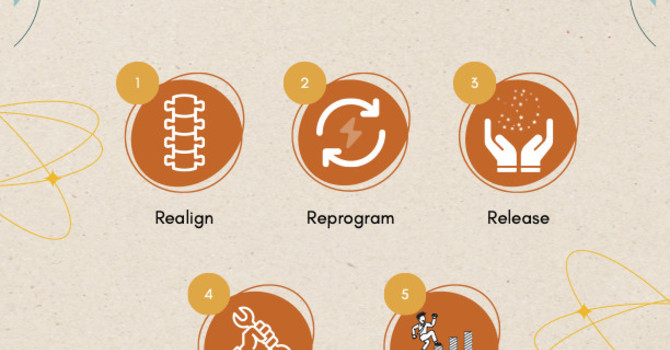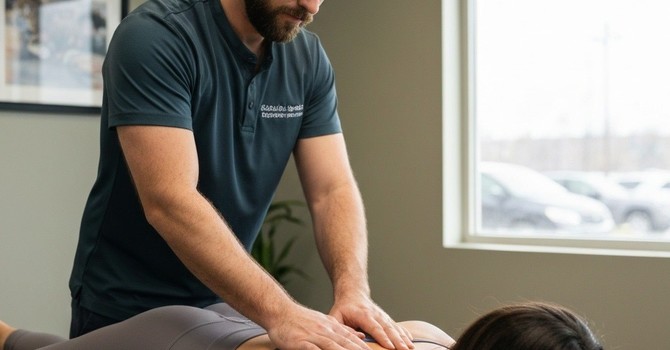
Have you ever been walking down the road or around your house and felt your hips clicking?
Maybe you’ve also heard your hips popping or cracking a little bit. If so, this may be the sign of an underlying problem.
This is a clinical condition characterized by an audible or palpable snapping sensation that is heard during movement of the hip joint, which commonly occurs when the muscle tendons around the hip joint become inflamed and begin to click as they rub over the hip socket bone.
The muscles that are usually responsible for flexing your hips when you walk are known as the hip flexors, one of which is the Psoas.This muscle starts at your lower spine and passes down through your pelvis. It attaches to your thigh bone (the femur), which enables it to perform its function of hip flexion.
The Psoas can often get tight, especially if you are somebody who sits in an office chair all day and you don’t perform very much exercise. When this muscle is tight, it can cause a range of problems. You can experience a sore lower back, aching buttocks, and clicking hips.
Your pelvic region is very bony and when your hip flexors are tight, it can cause your tendons to rub over the bony protrusions in your pelvis. It’s this interaction between your tendons and bones that can cause the audible clicking or grinding noises that appear to come from your hips.
Over time, the tendon can become irritated and inflamed, which worsen's the problem. Certain injuries or overuse of the tendon can also result in inflammation and excessive hip clicking. This is a condition that is informally known as dancer's hip because many dances experience these problems due to overuse of the joints.
Pain in the hip area and constant clicking or grinding is regularly experienced by athletes and runners as well. Again, this is due to overuse of the joints and tendons. Triathlon athletes commonly experience this since during the bike their hips are in a shortened position for a long period of time. Sprinters, jumpers or figure skaters often experience this as well. So do patients who have had lumbar spine surgery, since the nerves to the muscles of the pelvis are affected.
You may not necessarily always hear an audible click in your hips but you might feel the sensation of popping or grinding. This is still something to be aware of and you should still take action to reduce the tension in your hips.
A lot of the time, the main treatment for dancer's hip or clicking hips is rest and recovery. While you are resting, it’s a good idea to stretch out the hip flexor muscles to reduce tightness and tension in the area.
You may need to avoid high-intensity activities, such as sports, running, and dancing. Instead, it’s best to stick to low-impact exercises, such as gentle walking, swimming, or yoga. This will reduce tightness and irritation in the hip area, enabling the inflammation to go down and your hip joints to rest.
Treatment:
When a patient presents with a clicking hip, I always check hip ranges of motion to assess whether their hip joint may be involved. If the Femor head is bone on bone in the hip socket, there will be a lot of muscle compensation going on, such as an over or under working Quad or Psoas. I also check the alignment of the lumbar spine and pelvis, which is made of the Sacrum & Ilium in the back (The "S-I" joint) and the Pubic Symphisis in the front (yes, there's a joint in the front. It is a vertically-aligned joint with a vertical disc much like a spinal disc, which allows for the pelvis to widen during child birth. Even though men don't give birth, they also have this joint). If the lumbar or pelvis is out of alignment, this will affect the nerves which leave the spine and then branch and travel to related abdominal organs and muscles in the pelvic region and legs.
Chiropractic Adjustments include the spine, pelvis and extremities (bones of the arms & hands, legs & feet) are safe and quick, and can restore proper function to the region.
Functional Muscle Testing (aka orthopedic muscle testing) isolates individual muscles, much like how you isolate a muscle at the gym. A normal healthy muscle should lock "in the clear" and release when stimulated in particular ways. An abnormal muscle can be either hypertonic (too contracted) or hypotonic (too inhibited) and will lead to the nervous system recruiting other muscles to compensate.
In this way, I can quickly find where the imbalance is and either release where two muscles are binding up on each other using various modalities such as ART (Active Release Technique), or with Graston-type surgical-metal tools made for fascial scraping (like Graston tools) or with cupping (myofascial decompression). Rocktape can be utilized following a treatment. It is a cloth-based elastic and adhesive water proof Kinesiology tape which mimics skin and offers consistent micro-decompression to the region, which creates space between the fascial layers, allowing for increased neural feedback, blood and lymphatic flow.
Often I find that the problem isn't just the bound up muscles but rather the signals being sent from around the site (or elsewhere), leading to the brain telling other recruited muscles to take over incorrectly. I can use PDTR (Proprioceptive Deep Tendon Reflex technique) to analyze and neurologically reset this.
Functional rehab can be very effective, especially once I've realigned the spine, pelvis and legs and reset proper muscle firing patterns and supported with Rocktape. Proper function is all good and fine, but I am interested in what happens when the "rubber hits the road." That is, once the patient athlete assumes a cycling position, walks, runs, or jumps. By putting them into movement patterns, I can see how everything is functioning together. It's much like fixing your car and then taking it on a test drive to really test everything out.
So if you’re experiencing hip pain or clicking, give our office a call. We can take the time to determine the cause of your symptoms and start a treatment plan that will get you back on track.
Dr. Stefan Cohen
Contact Me



